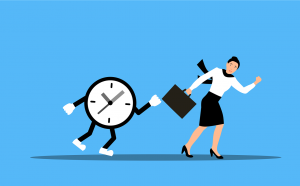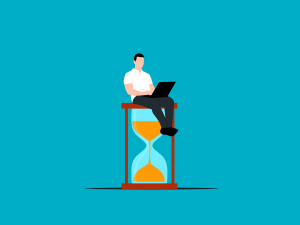What have you given up for your business? Sleep, free time, a healthy work-life balance? There was a time when we thought you had to eat, sleep, and dream your business to make it work and to get ahead, but now a lot of experts are rethinking the whole “workaholic” thing. In fact, not only is overworking yourself not good for you, it’s also not good for your bottom line. It turns out that working more doesn’t equal working better, so to get ahead (and stay sane), you might want to rethink the long hours you’re putting in.
A Pointless Amount of Overtime
Here’s one of the best and worst things about modern working life: technology allows us to always be just a tap away from work, and presumably allows us to constantly be getting more and more done. You can always be on, and so can your employees, and we’re often expected (or expect ourselves) to be always on, working longer and longer hours. But are these long hours necessary – or even beneficial? Here’s good news for your social life: studies have been done on this subject, and the answer is an emphatic no.

Take, for example, a study out of Stanford University. According to economics professor John Pencavel, working longer hours simply does not make us better workers, or more productive. In fact, he found that productivity per hour declines sharply when a person works more than 50 hours a week. After 55 hours, productivity drops so much that putting in any more hours would be pointless. And, those who work up to 70 hours a week are only getting the same amount of work done as those who put in 55 hours. Wait, what?
And how about this: in a study of consultants by Erin Reid, a professor at Boston University’s Questrom School of Business, managers could not tell the difference between employees who actually worked 80 hours a week and those who just pretended to. Reid was not able to find any evidence that those employees actually accomplished less, or any sign that the overworking employees accomplished more.
The funny thing is, we’ve actually known about this for a while. According to Harvard Business Review, “In the 19th century, when organized labor first compelled factory owners to limit workdays to 10 (and then eight) hours, management was surprised to discover that output actually increased – and that expensive mistakes and accidents decreased. This is an experiment that Harvard Business School’s Leslie Perlow and Jessica Porter repeated over a century later with knowledge workers. It still held true. Predictable, required time off (like nights and weekends) actually made teams of consultants more productive.”
So how can all this be? You probably already know the likely answer: the stress and fatigue that come with working long hours just aren’t conducive to working to your full potential. According to Pencavel, “In a nationally representative survey of almost 30,000 U.S. workers interviewed between August 2001 and May 2003, almost 38% replied affirmatively to the question, ‘Did you have low levels of energy, poor sleep, or a feeling of fatigue in the past two weeks?’ Full-time workers were more likely to lose productive time from fatigue than those working part-time.” You could have told us that, right?
Not only that, but you’re probably even more tired than you think, and the effects of being tired are also probably more pronounced than you think. Studies show that only 1-3% of the population can sleep five or six hours a night without suffering some performance drop-off; cut your sleep down to that amount for multiple nights in a row and you could be looking at a hit to your reaction speed, short-term and long-term memory, ability to focus, decision-making capacity, math processing, cognitive speed, and spatial orientation. In addition, for every 100 people who think they’re in the 1-3%, only five actually are.
And maybe it’s not just that. Maybe, as Alex Soojung-Kim Pang, a Stanford scholar and author of “Rest: Why You Get More Done When You Work Less,” writes “Busyness is not a means to accomplishment, but an obstacle to it.” He argues in his book that when we define ourselves by our “work, dedication, effectiveness and willingness to go the extra mile,” it’s easy to think that doing less is the real barrier to success – but maybe if we took the time to clear our minds, rest, and refocus, we could be getting things done in a better way.
A Worldwide Study
Not convinced that all this extra work isn’t making us more productive? We’ve got another study for you! And this 2021 study didn’t just look at individual workers; it compared the productivity of workers by country, along with how much they worked.
The B2B marketplace Expert Market looked at the workforces of 42 countries around the world, determining their productivity level by dividing the annual gross domestic product (GDP) – the value of all the goods and services produced within each country over a year – by the average number of hours full-time and part-time employees worked over a year.
Where did the US rank? We were 11th overall in productivity out of the 42 countries, which doesn’t sound so bad – but the more interesting part of the findings was that all of the ten countries ahead of us worked less than us. For example, in Luxembourg, the tiny European country at the top of the list, employees worked 1,427 total hours in 2020 and produced an average of $84.77 per person per hour, while in the US, we worked 1,767 total hours and produced an average of $36.94 per person per hour.
That means that workers in Luxembourg worked a whole lot less than we did, but their productivity was more than double ours! All of this data should lead us to the conclusion that overwork is just not worth it financially – but an even bigger problem is that it’s just not worth what it’s doing to our health.
What Is Overworking Doing to Our Health?
Research has shown that working too much can make many of the skills we use in modern working life, like interpersonal communication, making judgment calls, reading other people’s faces, or managing your own emotional reactions way more difficult. As we’ve already talked about, that’s probably because of the stress and exhaustion that overworking brings on. But stress and exhaustion aren’t just affecting the way we work, it’s also seriously affecting our health.
Numerous studies by Marianna Virtanen of the Finnish Institute of Occupational Health and her colleagues (as well as other studies) have found that overwork and the resulting stress can lead to all sorts of health problems, including impaired sleep, depression, heavy drinking, diabetes, impaired memory, and heart disease. Yikes.
Not only that, but the World Health Organization (WHO) did a study on deaths from stroke and heart disease related to working more than 55 hours a week, and the results were shocking. They found that long working hours led to 745,000 deaths from stroke and ischemic heart disease in 2016, a 29% increase since 2000. When broken down, they found that deaths from heart disease due to working long hours had increased by 42%, and from stroke by 19%.
All of this is bad enough when taken on its own, but you also have to remember that poorer health means higher health insurance/medical costs, lost time at work due to illness, presenteeism, and sky-high rates of employee turnover. So if working more and more is bad for you, bad for your employees, and bad for your business, sounds like it’s time to find a better work-life balance, right?
Finding a Better Work-Life Balance
So what can you do to find a better work-life balance, and encourage your employees to do the same? You and your employees can achieve a reasonable work-life balance if you all commit to the following steps:
- Set your hours, and stick to them! – Work when it’s time to work, and then go home and power down when it’s time to stop. Don’t work outside of your working hours unless absolutely necessary – those emails will still be there tomorrow!
- Prioritize your time – We’ve talked before about ways to more effectively manage your time, such as using the Eisenhower Matrix to determine what is urgent versus what is truly important. We’ve also talked about dealing with all of those little things that waste time at your business – check that out here
- Block off your time – Need another way to make sure you’re not overworking? Try dividing up your schedule into blocks of time, so you don’t commit to taking on more than you can actually get done.
- Use technology – Try using things like time and attendance software tools that include timeclocks, so you can keep track of how long certain recurring tasks take and either cut some out (see our advice in the two articles we linked to above), or better manage how they’re done, as well as more effectively block off your schedule.
- Take breaks – Yes, you heard us: you and your employees should always take some time off during the day, the week, and certainly on the weekends – take all the time that’s coming to you/them! Better yet, take vacations, and get away from work totally for a while (and no checking emails!)
Work is important, but not that important – not important enough to risk your health, your employees’ health, and the health of your business. If you’re overworking yourself or your employees, it’s time to take stock and find a better work-life balance for everyone – it’ll do you and your business good!